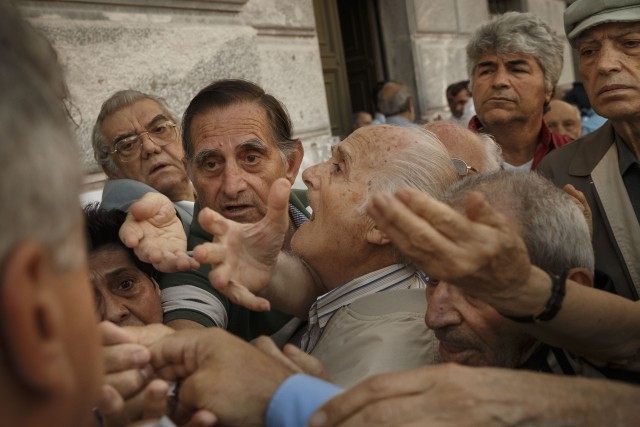Side-effects of the euro crisis are spreading beyond Greek borders into Bulgaria, Romania and Macedonia. Once seen as their poverty-stricken northern neighbours, Greeks are now looking to Bulgaria for some relief.
Euobserver reports that with Greek banks closed and the state in limbo pending the referendum, debt renegotiation and even a possible euro exit, hotels and restaurants in northern Greece have begun taking payments in Bulgarian levs (BGN). The foreign currency is then used as an entrepreneurial work around to avoid the Greek ATM restrictions recently introduced.
“Automatic teller machines in Thessaloniki had run out of cash and nobody could withdraw even five euros,” said Bulgarian Rumen Galabinov, who runs a financial consultancy and used to sit on Bulgaria’s financial and insurance supervision panels in 2003. He continued:
“After a lunch at a local restaurant, I joked, asking whether they would accept a payment in levs, and the owner agreed…
“…The restaurant owner, who also had two hotels, said his Bulgarian guests would be welcome to pay in levs. Then, the owner would travel to Sandanski [in southern Bulgaria] and exchange the levs for euros to have cash for his daily supplies.”
Galabinov also predicted both Greek businesses and private depositors may travel to Bulgaria to withdraw money from Greek bank branches there. Although the banks are established under Bulgarian law, therefore not subject to the Greek capital controls, they cannot transfer money to their Greek counterparts without permission from the Bulgarian National Bank.
Since mid-1997 BGN has been pegged to the euro at an exchange rate of BGN1.95 for €1. In order to sort out the aftermath of a financial crash and hyperinflation caused by government mismanagement, Bulgaria was then forced to introduce a currency board to promote financial stability.
In marked contrast to its neighbour it stuck with fiscal prudence and the former Communist country now has one of the lowest debt-to-GDP ratios in the EU – 27.6 per cent in 2014.
Under the leadership of centre-right Prime Minister Boiko Borisov the Bulgarian government set a working group tasked with the country’s application to join the eurozone. However, Borisov’s government isn’t in a hurry to file its application, instead opting to wait and see if the eurozone sorts out its problems. He told reporters at last week’s EU summit:
“If we would join now, we’d be paying the bill for richer, but less disciplined countries like Greece.”
Reuters reports a degree of negativity felt by neighbours who feel that a Greek contagion will hit them hard. Some Bulgarian workers express pity for the Greek plight but others say it is time for their neighbors – who despite years of austerity are still three times richer than they are – to start living within their means.
“The situation in Greece, unfortunately, will have a negative impact on Bulgaria as an investment destination too. Big investors look at the region in general,” said Veselin Iliev, director of International Economic Cooperation at Bulgaria’s leading industrial association BIA, “and our region is becoming quite unstable because of Greece. The attractiveness of the whole region is decreasing.”
Cross-border traffic between Greece and Bulgaria is also drying up, at the expense of Bulgarians. Bulgarian migrant workers used to head south to pick olives, tobacco or tomatoes but with one in four Greeks being jobless and nearly 60 business folding every day imported labour is reduced.
In addition Greeks used to travel north for tourism to towns like Sandanski. They used to bring the town revenues of about €1.5 million a month, but now it is less than €100,000.
Reuters quotes a Bulgarian worker bitter at how his parents receive a pension of BGN 200 a month whereas Greek pensions are still about eight times that amount.
“When we went to Greece, they were looking down on us,” he said. “When they came here, they were acting like the big shots. I think they should pay for that.”

COMMENTS
Please let us know if you're having issues with commenting.